Mark Swain's Blog, page 2
October 7, 2013
The Travelling Storyteller
On The Road Again
I knew a boy who was from birth, lured by a life on the open road. Some of his first memories (at around 3 years old) were of sitting at his bedroom window looking out at the big wide world and planning his escape from the confines of home. Some days his mother would see him in the garden with his fingers clinging to the fence, looking. I hear she came out once and asked him what he was looking at.
"When will I be big enough to go Mummy?" he asked her.
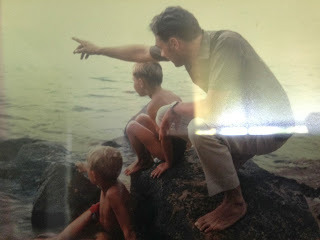
It was not that he was unhappy with his family. He loved them, and they him. In fact it I think it was feeling so secure about home and family that gave him the confidence that he could leave it. And it was not long before he did. Much to his parents' horror, some months before his fourth birthday he set out. He had worked out how to get over the tall side gate to the house. Heart racing with excitement, he headed off up the hill with a chocolate spread sandwich and an piece of cheese wrapped in a handkerchief on a stick, just like the one he had seen in a storybook. He was not sure where he was going – just out there. After about a mile he had the idea of visiting his grandmother to tell her about the adventure upon which he was embarking. She had a great sense of adventure too and would surely not tell him off. She was pleased to see him and after about half an hour, was careful not to let him see her telephone his mother. Just as he was saying that he needed to continue on his travels, his mother arrived in a frantic state. The boy's journey was cut short and he was severely warned about the dangers of being out on his own along busy main roads at only three years old. The mother, of course, did not understand that her son was completely safe and capable. He had been planning the trip for some time.
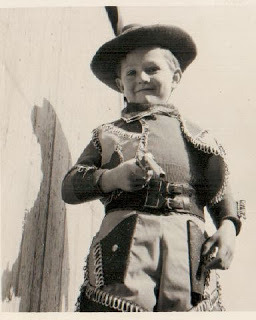
As time progressed, the boy continued to escape. The gate having been extended in height, he resorted to crawling under the hedge. There was no holding him. The parents wondered what kind of child they had produced. Soon the boy discovered atlases, maps and children's encyclopaedias. He began listening intently to radio and television programs, learning about places he could travel to. Lying awake thinking about them at night. More thought was given to the things he needed with him and he packed a secret running-away bag. A small duffle bag. It had a front zip pocket, into which he put the odd few coins he found lying around the house. Generally when he ran away, his mother had a good idea where to look. He would usually call into the corner shop, where he was popular with the three elderly sisters who ran the place. His mother would call there first to confirm his route and time of escape. Then she would try the swings and slide at the park. If he was not there she would try his grandmother's house and after that a petrol station and car repair depot on the outskirts of town, on the London road. This was about two miles away. At three or four it was usually as far as he could get in the time before she noticed him missing from the garden and caught up with him. Not having a car in those days, this provided his mother with a good deal of exercise as well as worry. No warning would deter him. Even when told of a little girl of eight along the road, who had been killed by a lorry when sent to the greengrocers by her mother, he did not feel the slightest hesitation about escaping again. It was his destiny.
It may have been destiny that protected this little boy from the perils of the road. Some would say it was just as likely to have been old-fashioned good luck. He himself believed it was due to his careful attention to detail. He remained convinced throughout his early years that a small child could learn to be as effective as an adult at getting about safely. Nothing his parents did or said would deter him from this view or from continuing to escape from home and in the end they came to accept it as something they could not change. They bore it as an affliction; seeing themselves as parents with a problem child. A disturbed child, perhaps.
Eventually, after continuing to cause havoc and worry in the family with his adventuring, this boy reached adulthood. Free to make his own choices in life, he took time away from higher education, and then from work, to hitch-hike around his native England, before venturing further afield into Europe and then on to India. Years of his life were spent in happy wandering through new and fascinating countries, meeting local people and sleeping under hedgerows or in haystacks. He loved this life and put study and career ideas to one side for a number of years, in order to travel further. People he met on his travels and his friends and family back in England alike, loved to hear the stories he told of his adventures. They envied him his life, but could not bring themselves to join him on the road, for they were busy climbing the ladder.
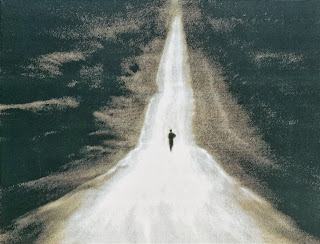
Although the young man loved his wandering life, he knew deep inside that one day he might meet someone who would make him want to give it up, and one day that event came about. Returning from the Orient with a beautiful young woman, the young man soon channelled his sense of adventure into life with a young family, albeit taking his family during his children's early years to live in a variety of countries that he had previously come to know during his travels. His children delighted in the amazing stories he told them at bedtime or on long car journeys.
In middle-age, drawing upon his wide experience of life and people, the young man set up a business that became a big success. He became wealthy and comfortable, although he never forgot the simple things he felt were most valuable in life. As the man's children grew, they developed a similar longing for the adventure of travel. As teenagers they sometimes asked him to take them on wandering journeys on the road, but he was often too busy with work. At the same time he began to find his life cluttered with possessions and responsibilities. Fortunately his wife valued him for his free spirit, however, and encouraged him to take time away from work to go wandering with his son. For a year they travelled overland together to the Orient, telling stories and drinking in the varied cultures and landscapes. The man realised that this was the true purpose of his life. The sense of destiny he had felt as a small boy flooded back and when they returned home he put commerce to one side. Travel, wandering, sleeping out under the stars and storytelling became his purpose again.

And so it was that a sense of happiness and calm became the true reward of this man's life. His life had followed a long and eventful circular journey, rather in the same way that his physical wanderings had. In the same way as a physical journey, he had set out full of enthusiasm with a singular focus. He had encountered obstacles on the way, causing him to divert in another direction. He had learned from mistakes. He had overcome difficulties that had made him stronger and wiser, and eventually he had begun to reap the rewards of his efforts. Now that his children had grown-up, he was encouraged by his wife to take her on wandering journeys with him and to write down the stories that previously had lived only in his head. Sometimes his adult children joined them. No longer did he feel he needed to choose between a life with his family and a life on the road. And the stories? The stories came forth from his mind like a river in full flood. Stories he had been telling for years as well as new stories, gathered from the memories of his life. People loved the stories, and he was happy. Happy to be back out there, on the road again.
Hold on tight to your dreams.
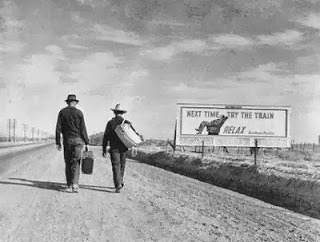 Picture courtesy of www.nocaptionneeded
Picture courtesy of www.nocaptionneeded
I knew a boy who was from birth, lured by a life on the open road. Some of his first memories (at around 3 years old) were of sitting at his bedroom window looking out at the big wide world and planning his escape from the confines of home. Some days his mother would see him in the garden with his fingers clinging to the fence, looking. I hear she came out once and asked him what he was looking at.
"When will I be big enough to go Mummy?" he asked her.

It was not that he was unhappy with his family. He loved them, and they him. In fact it I think it was feeling so secure about home and family that gave him the confidence that he could leave it. And it was not long before he did. Much to his parents' horror, some months before his fourth birthday he set out. He had worked out how to get over the tall side gate to the house. Heart racing with excitement, he headed off up the hill with a chocolate spread sandwich and an piece of cheese wrapped in a handkerchief on a stick, just like the one he had seen in a storybook. He was not sure where he was going – just out there. After about a mile he had the idea of visiting his grandmother to tell her about the adventure upon which he was embarking. She had a great sense of adventure too and would surely not tell him off. She was pleased to see him and after about half an hour, was careful not to let him see her telephone his mother. Just as he was saying that he needed to continue on his travels, his mother arrived in a frantic state. The boy's journey was cut short and he was severely warned about the dangers of being out on his own along busy main roads at only three years old. The mother, of course, did not understand that her son was completely safe and capable. He had been planning the trip for some time.

As time progressed, the boy continued to escape. The gate having been extended in height, he resorted to crawling under the hedge. There was no holding him. The parents wondered what kind of child they had produced. Soon the boy discovered atlases, maps and children's encyclopaedias. He began listening intently to radio and television programs, learning about places he could travel to. Lying awake thinking about them at night. More thought was given to the things he needed with him and he packed a secret running-away bag. A small duffle bag. It had a front zip pocket, into which he put the odd few coins he found lying around the house. Generally when he ran away, his mother had a good idea where to look. He would usually call into the corner shop, where he was popular with the three elderly sisters who ran the place. His mother would call there first to confirm his route and time of escape. Then she would try the swings and slide at the park. If he was not there she would try his grandmother's house and after that a petrol station and car repair depot on the outskirts of town, on the London road. This was about two miles away. At three or four it was usually as far as he could get in the time before she noticed him missing from the garden and caught up with him. Not having a car in those days, this provided his mother with a good deal of exercise as well as worry. No warning would deter him. Even when told of a little girl of eight along the road, who had been killed by a lorry when sent to the greengrocers by her mother, he did not feel the slightest hesitation about escaping again. It was his destiny.
It may have been destiny that protected this little boy from the perils of the road. Some would say it was just as likely to have been old-fashioned good luck. He himself believed it was due to his careful attention to detail. He remained convinced throughout his early years that a small child could learn to be as effective as an adult at getting about safely. Nothing his parents did or said would deter him from this view or from continuing to escape from home and in the end they came to accept it as something they could not change. They bore it as an affliction; seeing themselves as parents with a problem child. A disturbed child, perhaps.
Eventually, after continuing to cause havoc and worry in the family with his adventuring, this boy reached adulthood. Free to make his own choices in life, he took time away from higher education, and then from work, to hitch-hike around his native England, before venturing further afield into Europe and then on to India. Years of his life were spent in happy wandering through new and fascinating countries, meeting local people and sleeping under hedgerows or in haystacks. He loved this life and put study and career ideas to one side for a number of years, in order to travel further. People he met on his travels and his friends and family back in England alike, loved to hear the stories he told of his adventures. They envied him his life, but could not bring themselves to join him on the road, for they were busy climbing the ladder.

Although the young man loved his wandering life, he knew deep inside that one day he might meet someone who would make him want to give it up, and one day that event came about. Returning from the Orient with a beautiful young woman, the young man soon channelled his sense of adventure into life with a young family, albeit taking his family during his children's early years to live in a variety of countries that he had previously come to know during his travels. His children delighted in the amazing stories he told them at bedtime or on long car journeys.
In middle-age, drawing upon his wide experience of life and people, the young man set up a business that became a big success. He became wealthy and comfortable, although he never forgot the simple things he felt were most valuable in life. As the man's children grew, they developed a similar longing for the adventure of travel. As teenagers they sometimes asked him to take them on wandering journeys on the road, but he was often too busy with work. At the same time he began to find his life cluttered with possessions and responsibilities. Fortunately his wife valued him for his free spirit, however, and encouraged him to take time away from work to go wandering with his son. For a year they travelled overland together to the Orient, telling stories and drinking in the varied cultures and landscapes. The man realised that this was the true purpose of his life. The sense of destiny he had felt as a small boy flooded back and when they returned home he put commerce to one side. Travel, wandering, sleeping out under the stars and storytelling became his purpose again.

And so it was that a sense of happiness and calm became the true reward of this man's life. His life had followed a long and eventful circular journey, rather in the same way that his physical wanderings had. In the same way as a physical journey, he had set out full of enthusiasm with a singular focus. He had encountered obstacles on the way, causing him to divert in another direction. He had learned from mistakes. He had overcome difficulties that had made him stronger and wiser, and eventually he had begun to reap the rewards of his efforts. Now that his children had grown-up, he was encouraged by his wife to take her on wandering journeys with him and to write down the stories that previously had lived only in his head. Sometimes his adult children joined them. No longer did he feel he needed to choose between a life with his family and a life on the road. And the stories? The stories came forth from his mind like a river in full flood. Stories he had been telling for years as well as new stories, gathered from the memories of his life. People loved the stories, and he was happy. Happy to be back out there, on the road again.
Hold on tight to your dreams.
 Picture courtesy of www.nocaptionneeded
Picture courtesy of www.nocaptionneeded
Published on October 07, 2013 05:35
September 23, 2013
The Spark That Ignites The Memory
'Seldom have I heard a train pass by in the night and not wished I was on it.'
Flash!

This is an opening sentence of a book I love. Or rather it is not. At the start of Paul Theroux's 'The Great Indian Railway Bazar' he writes:
'Ever since childhood, when I lived within earshot of the Boston and Maine, I have seldom heard a train go by and not wished I was on it.'
I have adapted it in my mind to better fit what unlocks my own memories.
I lived away from my native England a lot as a child – Singapore (where I was born), Malaysia, Germany – and used to return to Folkestone in Kent for holidays to stay with my grandparents. They were the happiest of times. My grandparents lived close to the main railway line to London. I am old enough to remember steam trains. I used to stand on the footbridge and wave at the engine drivers as they sped under me. At night I would lie in the front bedroom, listening for the telltale rumble as another train gathered speed from the distant station and lie there picturing it beneath the bridge – the driver at the controls, the passengers still sorting out luggage on the racks or unfolding their newspapers. Looking out at the lights and the goings-on in the windows of houses as they passed. I strained my ears listening to the sound of the clacking wheels as it rushed on through the night into the distance. Reading Paul Theroux's opening words for the first time (and every time since), caused a kind of spark in my mind, followed by the unlocking of all these memories. I was back there. The sound of the trains. The smell of the smoke from the steam trains. The smell of those old station waiting rooms. The smell of my grandparents' house and the fruit-bowl in the living-room.
Not all writers can achieve this on-cue. At least not with a wide audience. It is what I look for in a writer and it is also, of course, what I strive to achieve myself as a writer. In order to achieve it one probably needs a good understanding of people. Empathy. We also need to read widely in order to see how other writers do it and we need to be aware of what excites these sparks in other readers. I find social media very useful in this respect. Twitter is particularly helpful, because of the 140 character limitation. Often I tweet a single sentence from one of my books or from a short story. I can fairly reliably gauge what sparks peoples imagination and unlocks their memories the most, by the number of favourites and retweets I get (allowing for possible influences of time). This way I am constantly building up and adapting an arsenal of incendiary words and phrases, or subject matter, that I know have power. Some last, where others are dependent upon what is happening in the world at the time, but it is a great way to train yourself and to stay sharp.
The sentence that regularly receives the most notice when I post on Twitter is:
'The chink of bottles, somewhere in the early morning traffic haze'
This seems to have that special power to cause sparks in people's minds and to unlock memories. I think we must all have been there. Stepping out into the street in the relative hush of the early morning. In this case there is activity - hence the haze caused by commuter traffic fumes, perhaps a low level hum - but there is an absence of sound clutter. The stillness is very apparent to us. Then, all of a sudden in this void there is a sharp sound. Not loud, but very noticeable. It is immediately recognisable as the chink of two bottles as they bang together. Our imagination lights up. We picture a milkman, perhaps, walking hurriedly from his milk-float (cart / van) to a terrace of houses, carrying a rack containing six cold, white bottles covered in condensation. The curtains in the houses are still drawn. A cat sitting on the step of number 8 darts out of the milkman's way. He is whistling a happy tune as he steps across a low fence to the next house. He'll be in trouble if he's seen. He has been asked by the lady at number 10 not to do that. Her mesembryanthemums are getting damaged. Why don't Blue Tits peck the tops off milk bottles to drink the cream anymore? Why doesn't milk taste like it used to? Why did granddad's porridge always taste better than your mum's and who was that boy you knew who used to faint at the breakfast table and once fell face first into his bowl of cornflakes?
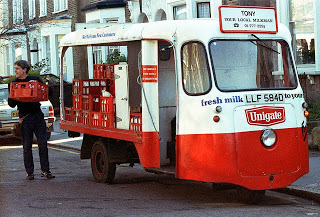
The fact is that the chink you heard could have been caused by a marble being rolled by two boys at a coke bottle while they waited for the school bus. It could have been a lady putting glass jars into a recycle bin or a wino waking up in a shop doorway and knocking over his empty cider bottle. But our minds and memories are acutely tuned. There are minute differences. Knowing this is important for a writer who wants to unlock people's memories. Not that sparking a host of different memories is necessarily a problem. I notice this now when I am reading. I learn from it.
N.B. The real life situation that inspired this piece of flash fiction (see previous post - Show Don't Tell) was set at a street cafe in Luang Prabang, Laos. An old vagrant lady was collecting discarded bottles for money. She actually lived in a kitchen cabinet on some waste ground by the road and used to blow cigarette smoke out through the plug-hole in the sink. But that doesn't matter. It has the power to unlock memories and I don't mind if those are different to the ones I experienced. The story is covered in full in the book Long Road Hard Lessons.
So who does it best and how do they achieve it?
Understanding people and being observant, I think. Having a good breadth of life experience also helps, but most of all I think it is about empathy. How much a writer notices the feelings we share. As someone who loves to read short stories, I am bound to say that I feel it is often best achieved by great short story writers. Less is more. These writers are adept and focussing on what are the key elements. The concentrated bits of information that expand inside the minds of readers like one of those dried Chinese flowers in a cup of tea, when the hot water is poured in. There is no space for lengthy explanations. The writer must transport the reader with a single sentence or even a word. A flash, as a memory is unlocked and proceeds to unfold, and unfold. And with that perfect principle in mind, I will say no more. I will simply take the books of two great writers at random from the shelf behind me and give you the opening sentence of each. In each case, so little opens up so much in our head.
The Grapes of Wrath by John Steinbeck (one of the best exponents of 'less is more')
'To the red country and part of the gray country of Oklahoma, the last rains came gently, and they did not cut the scarred earth.'
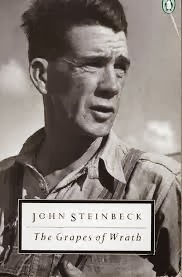
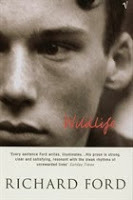
Wildlife by Richard Ford
'In the fall of 1960, when I was sixteen and my father was for a time not working, my mother met a man named Warren Miller and fell in love with him.'
Published on September 23, 2013 04:52
September 9, 2013
Story Inspiration
"Without making things up, life can be very dull and predictable."
People often ask writers where their inspiration for stories comes from. In my case it can be hard to remember. They often arrive by strange and circuitous routes. With others it's more obvious. Some are more clearly autobiographical, or are based upon events that people know I would be aware of. With many though, people seem to be completely baffled as to how I might have come up with them.
As I have said before, I believe that when you are a story writer it helps to be a bit of a fantasist, and even something of a liar. I have to confess to both, although these days I am known more for tactless divulgence of truths than of lies. But I lied a lot as a child. Probably because real life (whatever that is) was not interesting enough without it. I was a very naughty boy.
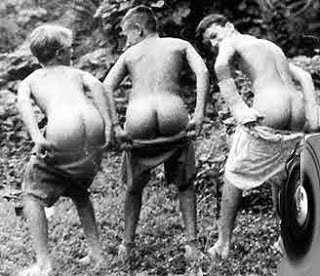
Without making things up, life can be very dull and predictable (for everyone), so I take an active role in doing something about it.
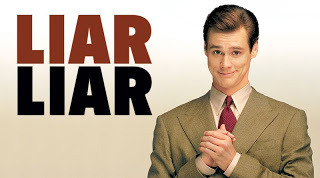
So how does this manifest itself? Well I suppose in place of telling lies for some sort of gain, or more often to avoid getting the blame for something, these days it tends to take the form of my throwing in some half-truths - or even blatant untruths - into a situation. I see it as being a little like adding spice or salt to the cooking (rarely sugar). In exactly that way I quickly see how things would be improved with a little of this, or a dash of that. Sometimes I'm wrong. Or sometimes it has a different effect to what I expect. Often it encourages a change of direction - wakes other people from sleepwalking through life. Of course at times I completely blow it and just piss people off - but not often (hah!). But it is this habit that I use as a tool for story writing - with the main difference being that the story creation is conducted in my head.
I can be in the middle of a conversation. Any kind of conversation. It could be with friends, with a my family, perhaps in a formal meeting, I might even be in a shop, or at the bank dealing with some mundane transaction or talking to a traffic warden. All situations have potential for my injecting a diversion into the proceedings and creating some sort of surprising outcome. Very often it is not a situation or conversation I am involved in. I merely witness or overhear it. Sometimes I am immediately struck by the possible deviation or imagined back-story, whereas on other occasions the idea comes to me as I remember the event later - particularly if I am relating it to someone else. And it is the latter circumstances that I find most fruitful. Probably since when I relate a real story to someone, I often feel it is not interesting enough without some embellishment - some poetic license. It is at this point that my wife or children always tell people not to take what I say too literally. They know me too well. It does amuse me when the recipient sometimes asks them not to discourage me. They prefer to hear my embellished version, it would seem.
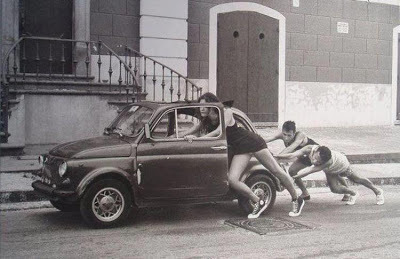
When I was in Italy recently, I saw a number of those little old Fiat 500's. Topolino's, they're called. They have become collectable. A few years ago I wrote a story about a London builder. A Cockney roofer, in fact, who had been contracted to do a few weeks work re-roofing a restaurant somewhere in rural Italy. The work coincided with the start of the hunting season and he was the unfortunate victim of a shooting accident, where some local hunters had fired celebratory shots through the ceiling of the restaurant. The Cockney roofer was wounded and then fell from the roof. Being out in the sticks he was driven to hospital, in a life-threatening condition, by someone in a Topolino. I won't tell you the full story but you can imagine the scene. He was a large man. Anyway, people I knew were at a loss to see how I might have come up with the story unless it was true. In fact the origin of the story was merely having once seen an elderly lady trying to fit her daughter and her large suitcase into one of these cars outside Charing Cross Station. Eventually the sunroof had been opened and they had driven off with the daughter's legs sticking out the top. As it was it did not make much of a story, but the fiasco remained in my mind. It was a few years before I had the idea for a story about a man injured at work who is encouraged to make a compensation claim by an Indian telesales lady. I often get those calls "Hello Mr Swain, have you had an accident in the last six years?"
Combining the two elements was a useful fit - rather like one of those children's toys where you can add interchangeable body parts to create a monster doll. The car made Italy an obvious choice of location for the story. As it happens, on my recent visit I saw one of these little Fiat 500's converted into an iced cream van. It was comical but it seemed to work and was very popular. It gave me inspiration for a new story. Not about a Topolino iced cream van. A hearse seemed more interesting...
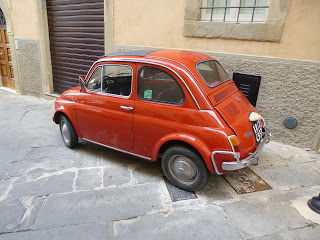
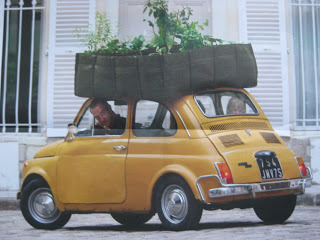
The story 'Topolino' can be found in the book 'Special Treatment & Other Stories'. Special Treatment won the Kinglake Prize for Modern Short Stories in 2010. The book is available on Amazon. Amazon.com link Amazon.co.uk linkOtherwise go to your local Amazon website and enter the title 'Special Treatment & Other Stories'
People often ask writers where their inspiration for stories comes from. In my case it can be hard to remember. They often arrive by strange and circuitous routes. With others it's more obvious. Some are more clearly autobiographical, or are based upon events that people know I would be aware of. With many though, people seem to be completely baffled as to how I might have come up with them.
As I have said before, I believe that when you are a story writer it helps to be a bit of a fantasist, and even something of a liar. I have to confess to both, although these days I am known more for tactless divulgence of truths than of lies. But I lied a lot as a child. Probably because real life (whatever that is) was not interesting enough without it. I was a very naughty boy.

Without making things up, life can be very dull and predictable (for everyone), so I take an active role in doing something about it.

So how does this manifest itself? Well I suppose in place of telling lies for some sort of gain, or more often to avoid getting the blame for something, these days it tends to take the form of my throwing in some half-truths - or even blatant untruths - into a situation. I see it as being a little like adding spice or salt to the cooking (rarely sugar). In exactly that way I quickly see how things would be improved with a little of this, or a dash of that. Sometimes I'm wrong. Or sometimes it has a different effect to what I expect. Often it encourages a change of direction - wakes other people from sleepwalking through life. Of course at times I completely blow it and just piss people off - but not often (hah!). But it is this habit that I use as a tool for story writing - with the main difference being that the story creation is conducted in my head.
I can be in the middle of a conversation. Any kind of conversation. It could be with friends, with a my family, perhaps in a formal meeting, I might even be in a shop, or at the bank dealing with some mundane transaction or talking to a traffic warden. All situations have potential for my injecting a diversion into the proceedings and creating some sort of surprising outcome. Very often it is not a situation or conversation I am involved in. I merely witness or overhear it. Sometimes I am immediately struck by the possible deviation or imagined back-story, whereas on other occasions the idea comes to me as I remember the event later - particularly if I am relating it to someone else. And it is the latter circumstances that I find most fruitful. Probably since when I relate a real story to someone, I often feel it is not interesting enough without some embellishment - some poetic license. It is at this point that my wife or children always tell people not to take what I say too literally. They know me too well. It does amuse me when the recipient sometimes asks them not to discourage me. They prefer to hear my embellished version, it would seem.

When I was in Italy recently, I saw a number of those little old Fiat 500's. Topolino's, they're called. They have become collectable. A few years ago I wrote a story about a London builder. A Cockney roofer, in fact, who had been contracted to do a few weeks work re-roofing a restaurant somewhere in rural Italy. The work coincided with the start of the hunting season and he was the unfortunate victim of a shooting accident, where some local hunters had fired celebratory shots through the ceiling of the restaurant. The Cockney roofer was wounded and then fell from the roof. Being out in the sticks he was driven to hospital, in a life-threatening condition, by someone in a Topolino. I won't tell you the full story but you can imagine the scene. He was a large man. Anyway, people I knew were at a loss to see how I might have come up with the story unless it was true. In fact the origin of the story was merely having once seen an elderly lady trying to fit her daughter and her large suitcase into one of these cars outside Charing Cross Station. Eventually the sunroof had been opened and they had driven off with the daughter's legs sticking out the top. As it was it did not make much of a story, but the fiasco remained in my mind. It was a few years before I had the idea for a story about a man injured at work who is encouraged to make a compensation claim by an Indian telesales lady. I often get those calls "Hello Mr Swain, have you had an accident in the last six years?"
Combining the two elements was a useful fit - rather like one of those children's toys where you can add interchangeable body parts to create a monster doll. The car made Italy an obvious choice of location for the story. As it happens, on my recent visit I saw one of these little Fiat 500's converted into an iced cream van. It was comical but it seemed to work and was very popular. It gave me inspiration for a new story. Not about a Topolino iced cream van. A hearse seemed more interesting...


The story 'Topolino' can be found in the book 'Special Treatment & Other Stories'. Special Treatment won the Kinglake Prize for Modern Short Stories in 2010. The book is available on Amazon. Amazon.com link Amazon.co.uk linkOtherwise go to your local Amazon website and enter the title 'Special Treatment & Other Stories'
Published on September 09, 2013 08:34
July 28, 2013
Travel Broadens The Story
"There's A Story In That"
If you're a reader or a writer, you must know the experience. You're travelling or on holiday somewhere, sitting at a cafe in a small village square. A group of locals are sitting opposite and begin a heated debate about something. The tempo rises. All of a sudden one man jumps to his feet and begins remonstrating with the others, making hand gestures you may not know but which you can guess the meaning of. You don't know the language well but you don't need to. You can guess what is being said. Not that you will be right – but you don't need to be right. Your version of what is being said could well be more interesting that the real one. Perhaps you are in Corsica and you know the reputation for family feuds and murders. The swarthy man has been accused of not avenging the murder of his cousin, Alberto. He has shamed the family. The sister says she is ashamed to be his sister. The swarthy man accuses her of having had an affaire with said dead cousin. Now the mother is on her feet. "Is this true?"
"No of course not, he would say anything to divert attention from his own guilt. He's a lying dog."
"It's true enough," says another woman, "Alberto promised he'd marry me but she wanted to keep him for herself – her bit on the side!"
"Don't you speak about my sister like that, you lying bitch!" says the swarthy man, "I'll kill you!"
"Yes you would, you bastard," replies the woman, "like you killed your cousin because you were jealous. It's well know that you were infatuated with your ugly sister. You wanted to keep her pure, like a princess, you weirdo!"
The argument continues with various members of the cast restraining each other until finally they are buying more drinks, hugging and celebrating their love for one another. You turn to your partner and say, "God, there's a story in that!"

Of course, many such opportunities are lost. I always used to try to keep a notebook with me to avoid forgetting, but often found myself without one. Nowadays, I nearly always have my i-phone with me so can add it to my 'Story Ideas' within Notes. Sometimes I don't find these notes until a year later, by which time the story has changed in my head. If they were the notes of a police constable that would be a problem, whereas with a writer of fiction it is a positive advantage.
Most of my short stories these days come from this kind of situation. When I first began writing short stories, I had a lifetime of remembered experiences to work with - an early life living in countries not of my own culture - but those mines have probably already given up most of their greatest riches. These days I need to find inspiration from elsewhere, and cafe tables are a good source. I have other favourites. The residents' lounge of an old people's home, where people are desperate to tell someone their story. Transport cafes where truck drivers and commercial travellers regale each other with tall tales of the road. The unemployment benefit office waiting room. Police stations. Railway carriages and buses – these are especially fruitful on market days in rural areas, where gossip among passengers is rife. Park benches where old people and winos congregate. Bars late at night are superb places for story inspiration. A weathered man, hung over a metal counter with a pained expressions of regret. What is his story? An ageing women with badly applied make-up, relentlessly stirring a cup of coffee. Does she have a family? Why is she alone? Sometimes I find a way to strike up a conversation with such people, but it's not necessary. Imagination can fill the gaps. Fiction is stranger than truth, as they say.
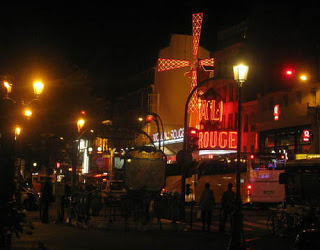
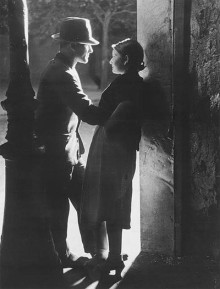
"Might one ask what you're writing about?" croaks the woman opposite.
It is 2am at an all night cafe in Pigalle, a seedy red-light quarter of Paris. The lines around her painted lips suggest her voice is the result of a lifetime's dependency upon the Gauloise cigarettes I can see in her cheap plastic handbag. She looks poor but she's drinking a cocktail with all the paraphernalia in it – fruit, mint, twizzle stick, parasol. She was probably beautiful once. Now her hair is growing thin from years of peroxide abuse.
"Of course. They are just notes I make when I have ideas."
"Ah bien sure, cheri," she replies, taking my hand gently, "but what sort of ideas? Ideas for what? Are you a policeman – a detective hunting for a murderer, perhaps? Or do you make movies?"
She smiles as she strokes my hand. Her teeth do not do her any favours.
"I write stories."
"Ooh," she replies, suggesting a kind of relish of something mysterious, "detective stories? Des histoire erotique peut etre?"
"Excursions into the lives of others," I reply. I translate it to be sure she has understood.
"Yes I understand," she says. "I have been on many such excursions. I have looked through the windows of so many souls, good and bad. Bad mostly.... No it is not true. I have loved many men. Women too. They are my constant companions, yet I remain alone. I have come to prefer it that way. Or perhaps I have no choice – it is my destiny. I share their journey for a while and then we part. It is my life."
"Why do they leave?" I ask, "Or why do you leave?"
"They die. These days anyway, mostly they die. It is my destiny, and theirs. But they die happy. I no longer have the power to attract young men like you."
She laughs and looks deep into my eyes. Incredible eyes she has. The eyes of a girl.
"So what do you seek in life...I'm sorry, I don't know your name."
"Marielle," she replies. "Enchante."
I tell her my name – except not my real name, of course.
"What are you seeking at this stage of your life, Marielle?"
"The same as always," she says, looking up from her cocktail. "I don't seek wealth, fame or a big house. Just someone who will hold me all night."
"But is that so hard to find?"
"Ah, you'd be surprised, cheri!" she laughs. "Men want to jump on your bones and then go. They promise not to – many promise not to. They probably can't help it. Maybe I am hard to love. And women? There is always a man somewhere who they left behind. They hate them, but when they call they will go."

I thank her for her conversation and go pay. I try to pay for her drink but the bearded woman at the counter simply tut-tuts and waves her finger. Despite my desire to close the door gently it closes with a harsh bang. I get as far as the corner before my conscience gets the better of me. As with her, perhaps destiny drove me back, or a desire to be able to help someone less fortunate than myself. It would cost me nothing to make her life happy just for one night. Arriving at the bar I hesitate before opening the door. Through the condensation on the window, I see her stroking the hand of an elderly gentleman. Her long fingers removing his gloves, the same grey toothed smile. Turning to walk away I catch the eye of the woman at the counter. Again that wagging finger.

If you're a reader or a writer, you must know the experience. You're travelling or on holiday somewhere, sitting at a cafe in a small village square. A group of locals are sitting opposite and begin a heated debate about something. The tempo rises. All of a sudden one man jumps to his feet and begins remonstrating with the others, making hand gestures you may not know but which you can guess the meaning of. You don't know the language well but you don't need to. You can guess what is being said. Not that you will be right – but you don't need to be right. Your version of what is being said could well be more interesting that the real one. Perhaps you are in Corsica and you know the reputation for family feuds and murders. The swarthy man has been accused of not avenging the murder of his cousin, Alberto. He has shamed the family. The sister says she is ashamed to be his sister. The swarthy man accuses her of having had an affaire with said dead cousin. Now the mother is on her feet. "Is this true?"
"No of course not, he would say anything to divert attention from his own guilt. He's a lying dog."
"It's true enough," says another woman, "Alberto promised he'd marry me but she wanted to keep him for herself – her bit on the side!"
"Don't you speak about my sister like that, you lying bitch!" says the swarthy man, "I'll kill you!"
"Yes you would, you bastard," replies the woman, "like you killed your cousin because you were jealous. It's well know that you were infatuated with your ugly sister. You wanted to keep her pure, like a princess, you weirdo!"
The argument continues with various members of the cast restraining each other until finally they are buying more drinks, hugging and celebrating their love for one another. You turn to your partner and say, "God, there's a story in that!"

Of course, many such opportunities are lost. I always used to try to keep a notebook with me to avoid forgetting, but often found myself without one. Nowadays, I nearly always have my i-phone with me so can add it to my 'Story Ideas' within Notes. Sometimes I don't find these notes until a year later, by which time the story has changed in my head. If they were the notes of a police constable that would be a problem, whereas with a writer of fiction it is a positive advantage.
Most of my short stories these days come from this kind of situation. When I first began writing short stories, I had a lifetime of remembered experiences to work with - an early life living in countries not of my own culture - but those mines have probably already given up most of their greatest riches. These days I need to find inspiration from elsewhere, and cafe tables are a good source. I have other favourites. The residents' lounge of an old people's home, where people are desperate to tell someone their story. Transport cafes where truck drivers and commercial travellers regale each other with tall tales of the road. The unemployment benefit office waiting room. Police stations. Railway carriages and buses – these are especially fruitful on market days in rural areas, where gossip among passengers is rife. Park benches where old people and winos congregate. Bars late at night are superb places for story inspiration. A weathered man, hung over a metal counter with a pained expressions of regret. What is his story? An ageing women with badly applied make-up, relentlessly stirring a cup of coffee. Does she have a family? Why is she alone? Sometimes I find a way to strike up a conversation with such people, but it's not necessary. Imagination can fill the gaps. Fiction is stranger than truth, as they say.


"Might one ask what you're writing about?" croaks the woman opposite.
It is 2am at an all night cafe in Pigalle, a seedy red-light quarter of Paris. The lines around her painted lips suggest her voice is the result of a lifetime's dependency upon the Gauloise cigarettes I can see in her cheap plastic handbag. She looks poor but she's drinking a cocktail with all the paraphernalia in it – fruit, mint, twizzle stick, parasol. She was probably beautiful once. Now her hair is growing thin from years of peroxide abuse.
"Of course. They are just notes I make when I have ideas."
"Ah bien sure, cheri," she replies, taking my hand gently, "but what sort of ideas? Ideas for what? Are you a policeman – a detective hunting for a murderer, perhaps? Or do you make movies?"
She smiles as she strokes my hand. Her teeth do not do her any favours.
"I write stories."
"Ooh," she replies, suggesting a kind of relish of something mysterious, "detective stories? Des histoire erotique peut etre?"
"Excursions into the lives of others," I reply. I translate it to be sure she has understood.
"Yes I understand," she says. "I have been on many such excursions. I have looked through the windows of so many souls, good and bad. Bad mostly.... No it is not true. I have loved many men. Women too. They are my constant companions, yet I remain alone. I have come to prefer it that way. Or perhaps I have no choice – it is my destiny. I share their journey for a while and then we part. It is my life."
"Why do they leave?" I ask, "Or why do you leave?"
"They die. These days anyway, mostly they die. It is my destiny, and theirs. But they die happy. I no longer have the power to attract young men like you."
She laughs and looks deep into my eyes. Incredible eyes she has. The eyes of a girl.
"So what do you seek in life...I'm sorry, I don't know your name."
"Marielle," she replies. "Enchante."
I tell her my name – except not my real name, of course.
"What are you seeking at this stage of your life, Marielle?"
"The same as always," she says, looking up from her cocktail. "I don't seek wealth, fame or a big house. Just someone who will hold me all night."
"But is that so hard to find?"
"Ah, you'd be surprised, cheri!" she laughs. "Men want to jump on your bones and then go. They promise not to – many promise not to. They probably can't help it. Maybe I am hard to love. And women? There is always a man somewhere who they left behind. They hate them, but when they call they will go."

I thank her for her conversation and go pay. I try to pay for her drink but the bearded woman at the counter simply tut-tuts and waves her finger. Despite my desire to close the door gently it closes with a harsh bang. I get as far as the corner before my conscience gets the better of me. As with her, perhaps destiny drove me back, or a desire to be able to help someone less fortunate than myself. It would cost me nothing to make her life happy just for one night. Arriving at the bar I hesitate before opening the door. Through the condensation on the window, I see her stroking the hand of an elderly gentleman. Her long fingers removing his gloves, the same grey toothed smile. Turning to walk away I catch the eye of the woman at the counter. Again that wagging finger.

Published on July 28, 2013 05:32
July 8, 2013
Stories From Real Life
"How Much of the Story is True?"
People often ask me this question. I am told this is because my characters are very vivid – that they are so defined and individual that they simply must be real. I'm told that the situations in my short stories are so out of the ordinary that they are not something a writer could just invent. But this is not true of course.
There is always an element of truth in everything a writer produces. There has to be – we draw our inspiration from what we know in life. One or two of the short stories I have written over the years are very close to the truth – stories where I didn't have to change much from the event and characters that inspired it – but this is not the norm. In my case, a situation arrises – something someone says or does or something I see on the news for example – that sparks my imagination.
A French friend once told me,
"My brother's not that happy in his life. He's married a North African woman with a big family who all live nearby. In their culture they expect the whole extended family to share what they have. It sounds nice but they used to borrow his nice car and it would always come back damaged. It tortures him."
I thought about this brother – a rather obsessional man of habit – and how a man like him might try to resolve this situation. I imagined him arguing with his wife but seeing how she would always see it according to her culture. He was being mean. I imagined what he might do to deal with this borrowing expectation – how a man of his nature might develop strategies and adopt strangely complex systems to make it not possible for the family to borrow his things, but without it seeming like he was being mean. Before too long I had weaved a detailed character in my head and a whole set of bizarre behaviours he might adopt. I imagined him with a valuable classic car he had painstakingly saved for as a younger man – his efforts over years to restore it. I imagined him marrying this beautiful exotic creature and then discovering the family culture thing. He would be desperate not to lose her but tortured by the possible damage to his cherished car. He thinks of selling it but can't bear to part with it. He could say it had been stolen. He begins by saying it's not insured for others to drive, of course, but these are North Africans. Eventually, in a state of mania, he resorts to taking a part (the rotor arm for example) out of the car so that it won't work. This means he can't drive it either, but it is a price worth paying, he feels.

I wrote down the story and developed it. It seemed like it had legs, as they say. I built up the characters of the man, his wife, her family, the man's work colleagues etc. I described their apartment and the car – it was a Porsche 365 I think. The story was set in the UK and the woman became Afro-caribbean. When A few years later the story was published in a book of short stories and I sent a copy to my French friend. Later I asked him how he liked the stories. I waited for him to remark upon the character based upon his brother, which he did not. I asked him which of the stories he liked best and he said he loved the one about the guy with the Porsche. I told he this was unsurprising since it was based upon what he told me about his brother. He was confused. Nothing in the story seemed to him to relate to his brother. I mentioned the car and the cultural issues with his wife's family. He saw the link but insisted it was such a different story that his brother's life was unrecognisable in it.
The above example is typical. Generally it is unlikely that anyone is going to accuse me of making public their closely guarded secrets to my public readership. My wife worries about this a lot I have to say. But the characters and situations are too much changed. They absorb characteristics of other people I have known or heard about. The circumstances and back story changes. The environment changes and so does the story. All embellished with things I remember from my past, from films, from television programs and even from other books. I have a good memory!
You might find it interesting to know, that my French friend told his brother what the man in the story did to avoid having his precious possessions borrowed and his brother tried it out with some success. I'm very happy to have acted as his therapist in this case.
By the way, for those who are wondering, the story in question is named For The Love of Marsha, and is one of the stories in the book, Special Treatment and Other Stories.
The blog about this book and the link to its listing on Amazon is here
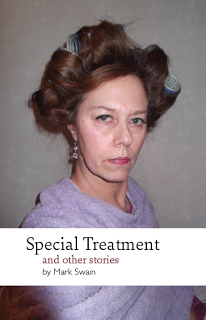
People often ask me this question. I am told this is because my characters are very vivid – that they are so defined and individual that they simply must be real. I'm told that the situations in my short stories are so out of the ordinary that they are not something a writer could just invent. But this is not true of course.
There is always an element of truth in everything a writer produces. There has to be – we draw our inspiration from what we know in life. One or two of the short stories I have written over the years are very close to the truth – stories where I didn't have to change much from the event and characters that inspired it – but this is not the norm. In my case, a situation arrises – something someone says or does or something I see on the news for example – that sparks my imagination.
A French friend once told me,
"My brother's not that happy in his life. He's married a North African woman with a big family who all live nearby. In their culture they expect the whole extended family to share what they have. It sounds nice but they used to borrow his nice car and it would always come back damaged. It tortures him."
I thought about this brother – a rather obsessional man of habit – and how a man like him might try to resolve this situation. I imagined him arguing with his wife but seeing how she would always see it according to her culture. He was being mean. I imagined what he might do to deal with this borrowing expectation – how a man of his nature might develop strategies and adopt strangely complex systems to make it not possible for the family to borrow his things, but without it seeming like he was being mean. Before too long I had weaved a detailed character in my head and a whole set of bizarre behaviours he might adopt. I imagined him with a valuable classic car he had painstakingly saved for as a younger man – his efforts over years to restore it. I imagined him marrying this beautiful exotic creature and then discovering the family culture thing. He would be desperate not to lose her but tortured by the possible damage to his cherished car. He thinks of selling it but can't bear to part with it. He could say it had been stolen. He begins by saying it's not insured for others to drive, of course, but these are North Africans. Eventually, in a state of mania, he resorts to taking a part (the rotor arm for example) out of the car so that it won't work. This means he can't drive it either, but it is a price worth paying, he feels.

I wrote down the story and developed it. It seemed like it had legs, as they say. I built up the characters of the man, his wife, her family, the man's work colleagues etc. I described their apartment and the car – it was a Porsche 365 I think. The story was set in the UK and the woman became Afro-caribbean. When A few years later the story was published in a book of short stories and I sent a copy to my French friend. Later I asked him how he liked the stories. I waited for him to remark upon the character based upon his brother, which he did not. I asked him which of the stories he liked best and he said he loved the one about the guy with the Porsche. I told he this was unsurprising since it was based upon what he told me about his brother. He was confused. Nothing in the story seemed to him to relate to his brother. I mentioned the car and the cultural issues with his wife's family. He saw the link but insisted it was such a different story that his brother's life was unrecognisable in it.
The above example is typical. Generally it is unlikely that anyone is going to accuse me of making public their closely guarded secrets to my public readership. My wife worries about this a lot I have to say. But the characters and situations are too much changed. They absorb characteristics of other people I have known or heard about. The circumstances and back story changes. The environment changes and so does the story. All embellished with things I remember from my past, from films, from television programs and even from other books. I have a good memory!
You might find it interesting to know, that my French friend told his brother what the man in the story did to avoid having his precious possessions borrowed and his brother tried it out with some success. I'm very happy to have acted as his therapist in this case.
By the way, for those who are wondering, the story in question is named For The Love of Marsha, and is one of the stories in the book, Special Treatment and Other Stories.
The blog about this book and the link to its listing on Amazon is here

Published on July 08, 2013 01:14
June 10, 2013
Show Don't Tell
In Praise of Shorter Stories
Ernest Hemingway famously said,
If a writer of prose knows enough of what he is writing about he may omit things that he knows and the reader, if the writer is writing truly enough, will have a feeling of those things as strongly as though the writer had stated them. The dignity of movement of an ice-berg is due to only one-eighth of it being above water.
It has been pointed out by others, that 'showing' takes more words than 'telling'. I disagree. Poetry manages to convey so much in so few words. By employing certain powerful words that trigger emotions and memories in the reader / listener, the writer can open up a myriad of thought and feelings that do not need to be written down. I try to use this principle in my own writing. It is not easy. Firstly you tend to slip back into telling without realising it. It's less effort. With dedication and a certain amount of luck (feeling right at the time), I might spot this during my editing process and improve it.
Generally I write short stories. I probably do this because I have a particular love of reading short stories. Chekov, Raymond Carver and Richard Ford are my particular favourites although I have many more. Many novellists write excellent short stories, or have done in the past. Steinbeck, Hemingway Orwell, John Updike, Norman Mailer are just a few others Margaret Atwood I particularly like. Steinbeck and Orwell in particular, seem to me to write in the condensed style common to short story writers. They appear to utilise the 'show don't tell' principle very well.
Often when I write a short story, I edit it into several versions of differing length. Initially I did this in order to enter them into writing competitions that require stories limited to a maximum number of words. It took me a little time to discover, that readers always seem to get more from the shortest version. Often these are what have come to be named 'Flash Stories.' In this form, the story seems to capture people's imagination. Some readers, I find, have interpreted the story differently to others. This is bound to happen with the 'show, don't tell' technique, where people are using their own background experiences to fill in the gaps. Some writers might balk at this. They want their readers to understand exactly what is in their (the writer's) mind. This is not a problem to me. I am happy for my stories to be a trigger that opens up a number of slightly different stories in people's minds.
I accept that the experience of readers preferring my shortest stories, could be peculiar to me, but I do not think it likely. I would advise all fiction (even non-fiction) writers, therefore, to give it a try. Take one of your stories and condense it. Set yourself a word number as a target. Once you have achieved this, try producing a shorter version, perhaps a third shorter. Continue until you have something of about 140 words, then show it to someone who knows the full length story well and see what the result is.
Here is an example of a flash story that began life as a short story of around 4,000 words. It is so far unpublished and is intended as one of a book of flash stories at some later date:
The Bottle Lady of Luang Prabang. By Mark Swain.Days passed slowly. Most began with breakfast at our street café. The chink of glass somewhere in the early morning traffic haze. Through the dust, a haggard woman is sorting bottles on a patch of waste ground. A kitchen cupboard lies dumped there. I propose she lives in it. Comic, until she climbs inside. We stare, waiting, but she stays put. A policeman arrives. Moving her on? No. Handing her a coffee and cigarette. He departs, tipping his hat. We leave; pass her camp and notice smoke from the plughole. A plume, rising in the still air. We wander home. Perhaps we ordered the ‘happy breakfast’ by mistake?
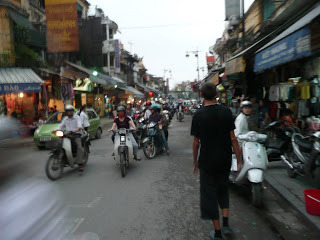
Ernest Hemingway famously said,
If a writer of prose knows enough of what he is writing about he may omit things that he knows and the reader, if the writer is writing truly enough, will have a feeling of those things as strongly as though the writer had stated them. The dignity of movement of an ice-berg is due to only one-eighth of it being above water.
It has been pointed out by others, that 'showing' takes more words than 'telling'. I disagree. Poetry manages to convey so much in so few words. By employing certain powerful words that trigger emotions and memories in the reader / listener, the writer can open up a myriad of thought and feelings that do not need to be written down. I try to use this principle in my own writing. It is not easy. Firstly you tend to slip back into telling without realising it. It's less effort. With dedication and a certain amount of luck (feeling right at the time), I might spot this during my editing process and improve it.
Generally I write short stories. I probably do this because I have a particular love of reading short stories. Chekov, Raymond Carver and Richard Ford are my particular favourites although I have many more. Many novellists write excellent short stories, or have done in the past. Steinbeck, Hemingway Orwell, John Updike, Norman Mailer are just a few others Margaret Atwood I particularly like. Steinbeck and Orwell in particular, seem to me to write in the condensed style common to short story writers. They appear to utilise the 'show don't tell' principle very well.
Often when I write a short story, I edit it into several versions of differing length. Initially I did this in order to enter them into writing competitions that require stories limited to a maximum number of words. It took me a little time to discover, that readers always seem to get more from the shortest version. Often these are what have come to be named 'Flash Stories.' In this form, the story seems to capture people's imagination. Some readers, I find, have interpreted the story differently to others. This is bound to happen with the 'show, don't tell' technique, where people are using their own background experiences to fill in the gaps. Some writers might balk at this. They want their readers to understand exactly what is in their (the writer's) mind. This is not a problem to me. I am happy for my stories to be a trigger that opens up a number of slightly different stories in people's minds.
I accept that the experience of readers preferring my shortest stories, could be peculiar to me, but I do not think it likely. I would advise all fiction (even non-fiction) writers, therefore, to give it a try. Take one of your stories and condense it. Set yourself a word number as a target. Once you have achieved this, try producing a shorter version, perhaps a third shorter. Continue until you have something of about 140 words, then show it to someone who knows the full length story well and see what the result is.
Here is an example of a flash story that began life as a short story of around 4,000 words. It is so far unpublished and is intended as one of a book of flash stories at some later date:
The Bottle Lady of Luang Prabang. By Mark Swain.Days passed slowly. Most began with breakfast at our street café. The chink of glass somewhere in the early morning traffic haze. Through the dust, a haggard woman is sorting bottles on a patch of waste ground. A kitchen cupboard lies dumped there. I propose she lives in it. Comic, until she climbs inside. We stare, waiting, but she stays put. A policeman arrives. Moving her on? No. Handing her a coffee and cigarette. He departs, tipping his hat. We leave; pass her camp and notice smoke from the plughole. A plume, rising in the still air. We wander home. Perhaps we ordered the ‘happy breakfast’ by mistake?

Published on June 10, 2013 02:58
April 20, 2013
A Good Excuse to Hang Around in Sleazy Bars
Once, after reading a biography about George Orwell, I took myself off to Paris. In the book there were references to the real names of places in his book 'Down and Out in Paris and London.' The hotel where he worked as a dishwasher (Hotel Lotti next to the Place de Vendome). The street where he pawned his shirt collars (in Belleville). The cafe where he often went for breakfast. This was back in the 1980's so I didn't have the luxury of the internet. I had loved Down & Out so much when I read it in the early 70's and I really felt I knew the places he mentioned in the book - many with changed names - so it almost felt like I was going there to rediscover these places from my own past. I spent a week roaming around the back streets of various parts of Paris, feeling a little like a detective. None of these places had plaques up saying 'George Orwell pawned his shirt collars here' or 'was sacked from here' or anything. This was original research, or at least it felt like it. By the end of that week, my feet were sore but I flet like I'd recaptured my youth.
A number of years went by before I attempted to do this again. I was recounting the story at dinner with friends one evening. Later my wife asked me if I'd take her to these places. I said I would sometime, but that I'd rather do something new. How about another Orwell - Homage to Catalonia. Soon after we found ourselves in Las Ramblas in Barcelona, trying to persuade someone to let us get out onto the rooftops of the old post office building, from where Orwell had fought a gun battle with Franco's troops in the streets below. We sat under the palm trees, eating a simple lunch of tortilla with pan con tomate, as he might have in the Placa Real and we took a bus out into the hills where he spent weeks dodging bullets in the cold winter after the partisans/ retreat from outside Valladolid. It was thrilling.
Since that time I have had a trip to Amsterdam seeking out bars and cafes that feature in Camus' 'The Fall' and to Oran to experience the same author's world of 'The Outsider' (or The Stranger). All have turned what might have been a reasonably pleasurable holiday into something of intense interest and pleasure. It has given the locations real meaning for me and memories that are indelibly burned into my memory. Why don't you give it a try sometime? It's so much easier now with the internet. Of course some people will think it strange. A friend of mine said it was a poor excuse for hanging around in sleazy bars. "Who needs an excuse?" I replied.
N.B. Fired by this obsession, in my own writing I often remember to mention the names of cafes, bars and places I hope readers might be inspired to visit. You'll find plenty in 'Long Road, Hard Lessons,' of course, but also in 'Special Treatment'. If the name is disguised, the disguise is usually very thin.
Others on my hit list for the near future are:
Goodbye to Berlin - Christopher Isherwood (Berlin)
As I Walked Out One Mid-summer Morning - Laurie Lee (Spain)
Cannery Row - John Steinbeck (Monterey)
Trainspotting - Irvine Welsh (Edinburgh - does 'the worst toilet in the world' really exist?)
The Alexandria Quartet - Lawrence Durrell (Alexandria)
A Time of Gifts - Patrick Leigh-Fermor (a walk from Hook of Holland to Constantinople)
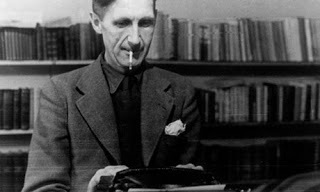 Photo courtesy theguardian.co.uk
Photo courtesy theguardian.co.uk
A number of years went by before I attempted to do this again. I was recounting the story at dinner with friends one evening. Later my wife asked me if I'd take her to these places. I said I would sometime, but that I'd rather do something new. How about another Orwell - Homage to Catalonia. Soon after we found ourselves in Las Ramblas in Barcelona, trying to persuade someone to let us get out onto the rooftops of the old post office building, from where Orwell had fought a gun battle with Franco's troops in the streets below. We sat under the palm trees, eating a simple lunch of tortilla with pan con tomate, as he might have in the Placa Real and we took a bus out into the hills where he spent weeks dodging bullets in the cold winter after the partisans/ retreat from outside Valladolid. It was thrilling.
Since that time I have had a trip to Amsterdam seeking out bars and cafes that feature in Camus' 'The Fall' and to Oran to experience the same author's world of 'The Outsider' (or The Stranger). All have turned what might have been a reasonably pleasurable holiday into something of intense interest and pleasure. It has given the locations real meaning for me and memories that are indelibly burned into my memory. Why don't you give it a try sometime? It's so much easier now with the internet. Of course some people will think it strange. A friend of mine said it was a poor excuse for hanging around in sleazy bars. "Who needs an excuse?" I replied.
N.B. Fired by this obsession, in my own writing I often remember to mention the names of cafes, bars and places I hope readers might be inspired to visit. You'll find plenty in 'Long Road, Hard Lessons,' of course, but also in 'Special Treatment'. If the name is disguised, the disguise is usually very thin.
Others on my hit list for the near future are:
Goodbye to Berlin - Christopher Isherwood (Berlin)
As I Walked Out One Mid-summer Morning - Laurie Lee (Spain)
Cannery Row - John Steinbeck (Monterey)
Trainspotting - Irvine Welsh (Edinburgh - does 'the worst toilet in the world' really exist?)
The Alexandria Quartet - Lawrence Durrell (Alexandria)
A Time of Gifts - Patrick Leigh-Fermor (a walk from Hook of Holland to Constantinople)
 Photo courtesy theguardian.co.uk
Photo courtesy theguardian.co.uk
Published on April 20, 2013 08:51
March 9, 2013
Special Treatment & Other Stories
SPECIAL TREATMENT - and other stories
Mark Swain describes these 12 short stories as excursions into the lives of others. In each story we find ourselves transported – thoroughly absorbed. We are there. Some places we think we recognise, while others are unfamiliar, even mysterious. There are dark corners, but most of all there is humour – poignant and frequently ironic. The locations are illuminated for us. Vivid images; the atmospheres; the smells and sounds. But it is the characters we are drawn to: A divorcee hairdresser who dotes on her son. A resentful victim of a construction-site accident. An elderly man victimised by political activists. A boy’s summer job. Lovers. Adventurers. Workers. Travellers. Prisoners. They open their lives to us. We are let into their secrets.
There is an authenticity to Mark Swain’s characters that can leave the reader feeling almost like a voyeur. We are privileged. We know them; care about their plight; laugh and cry with them. We can certainly never forget them.
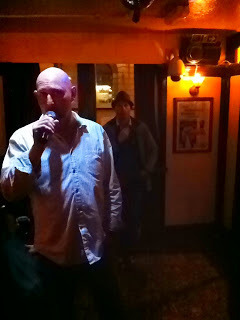
Buy from Amazon
Published on March 09, 2013 06:59
March 4, 2013
A Compulsive Liar
These days, Mark Swain spends much of his time writing:
"Ideas just keep coming," he says. "I think it's probably due to the intense variety of my early life – well most of it actually. I was born in Singapore while my father was in the RAF. I spent most of my early childhood in exotic locations. I can still smell the magic of those places now. Then I was in Europe as a teenager. Germany and France for a lot of it but I went to boarding school in England. I went to Art College, I joined the Army for a brief spell of adventure, did a variety of jobs, set up businesses, then worked on a cruise ship travelling the world (QE2), before going to work in Japan as an English teacher. I had a wild time and travelled a lot in between. Then I set up a business in Barcelona before returning to Canterbury in the UK where I've stayed while my 3 children grew up. I put my business in the hands of my business partner for a year and cycled to Japan with my son. He runs it now - and very well, I'm happy to say. I've made my own luck. I'm starting to feel the desire to spend my time more in places like India, Morocco and Japan now the children are grown-up. All that variety when I was younger has given me an infinite amount of material to build stories with. Although my first book was non-fiction, it's fiction I feel most at home with. I was a chameleon and a compulsive liar as a kid. Ask my poor mother!"
"Ideas just keep coming," he says. "I think it's probably due to the intense variety of my early life – well most of it actually. I was born in Singapore while my father was in the RAF. I spent most of my early childhood in exotic locations. I can still smell the magic of those places now. Then I was in Europe as a teenager. Germany and France for a lot of it but I went to boarding school in England. I went to Art College, I joined the Army for a brief spell of adventure, did a variety of jobs, set up businesses, then worked on a cruise ship travelling the world (QE2), before going to work in Japan as an English teacher. I had a wild time and travelled a lot in between. Then I set up a business in Barcelona before returning to Canterbury in the UK where I've stayed while my 3 children grew up. I put my business in the hands of my business partner for a year and cycled to Japan with my son. He runs it now - and very well, I'm happy to say. I've made my own luck. I'm starting to feel the desire to spend my time more in places like India, Morocco and Japan now the children are grown-up. All that variety when I was younger has given me an infinite amount of material to build stories with. Although my first book was non-fiction, it's fiction I feel most at home with. I was a chameleon and a compulsive liar as a kid. Ask my poor mother!"
Published on March 04, 2013 03:30



